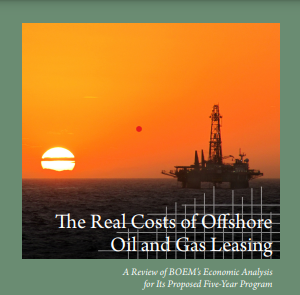In July, the Bureau of Ocean Energy Management (BOEM) released its proposed five-year offshore leasing plan, which contemplates scheduling anywhere from zero to eleven lease sales over the coming half-decade. As part of that proposal, BOEM conducts a cost-benefit analysis in which it finds net benefits from offshore leasing, but recognizes uncertainty and specifically calls for comment on this analysis.
In response to this call for comments, Policy Integrity submitted two original reports offering extensive feedback on BOEM’s cost-benefit analysis. As detailed in those reports, BOEM’s analysis severely understates the costs of OCS leasing—particularly the climate costs. Our reports offer original analysis and modeling finding that, properly considered, the climate costs of offshore leasing alone may exceed the total benefits from that leasing.
The two reports are:
The Real Costs of Offshore Oil and Gas Leasing highlights numerous ways that BOEM’s analysis understates the costs of offshore leasing, provides original economic modeling finding that the climate costs of the proposed program alone may exceed the program’s total benefits, and offers suggestions for improvement. Of particular interest, this report responds to BOEM’s request for comments on how to integrate a transitioning economy into the agency’s energy substitution modeling. Our original substitution modeling demonstrates that, if the transitioning economy is considered, net greenhouse gas emissions from the proposed leasing could potentially be triple or quadruple the agency’s current estimates.
Interior’s Authority to Consider Downstream Emissions from Offshore Leasing criticizes BOEM’s decision to omit downstream greenhouse gas emissions from its cost-benefit analysis. The report explains that BOEM misreads case law, which does not prohibit the agency from considering downstream emissions and in fact indicates that it has the authority to consider those emissions. This report also analyzes the Outer Continental Shelf Lands Act’s text, legislative history, and regulatory history, which all support BOEM’s authority to consider the downstream impacts of oil and gas consumption.





